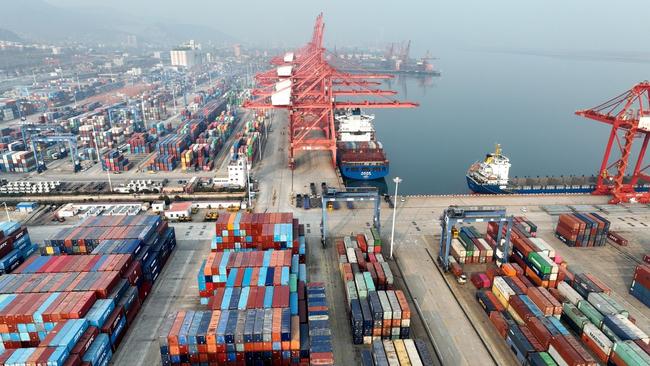ANZ supply chain experts say old ways are over as clients recalibrate from pandemic constriction
ANZ Institutional Bank’s supply chain experts say companies buying out of China and Asia are looking to diversify their point of supply.

Companies tapping Asia’s markets are shifting away from pandemic-era measures to bulk up supplies, but ANZ expects many will retain added storage and look at new options after learning hard lessons in recent years.
ANZ supply chain finance sales director Mary Ng said the bank’s clients had “learned from the pandemic” with a move away from just-in-time procurement policies and plans to diversify manufacturing markets and suppliers.
Ms Ng said over the past few years the key concern of clients had been stocking up on inventories.
“Many of our clients are moving from just-in-time to just-in-case,” she said.
“We’ve all learned, clients are trying to strike a balance.”
ASX-listed online retailer Kogan was stung by supply chain bottlenecks, as outbreaks of Covid-19 in China disrupted shipments heading to the company’s warehouses.
In January last year, Kogan revealed its profits were down 58 per cent amid supply chain disruptions. But Kogan’s attempts to stock up left the company with bloated inventories and backlogs of stock in warehouses, forcing the firm to heavily discount goods in a bid to clear space.
Kogan slashed inventories, which topped out at $227.9m in June 2021, falling to $98.3m in January this year.
ANZ plays a key role for its institutional clients, managing the settlement of payments for goods purchased and delivered.
With more than 7000 major institutional grade clients, the bank has key exposure across Australia’s retail landscape.
Ms Ng said many of these companies were working with suppliers to help them diversify, to avoid any potential repeat of single-source disruptions.
Many Chinese suppliers were forced to shutter operations in the face of Covid-19 outbreaks, while similar outbreaks also disrupted port operations out of China’s huge export terminals.
“Our clients come in to help their suppliers, to ensure their liquidity to support their suppliers,” Ms Ng said.
ANZ head of transactional banking and North Asia Adesh Sarup said clients were not just considering how much of goods they ordered, but where they held those goods.
He said many were looking at diversifying “the geographies you look at”, with many clients not considering the issue in the past five to 10 years.
Mr Sarup said it was becoming increasingly important for ANZ’s institutional customers to access real time or faster payment systems to strip out logjams in procurement.
“Every one of our institutional customers said they cannot deal with any kind of supply chain disrupters,” he said.
Mr Sarup added that recent years, which have seen an up-ending of supply chains, with food and energy prices spiking, required more co-operation between clients and suppliers.
He said this included sharing expertise around cyber risks.
“A cyber event in any industry can be catastrophic,” he said.
The Colonial Pipeline, the US’s largest fuel pipeline, was crippled by a hack in May 2021 after hackers attacked systems used to manage distribution, leading to supply disruptions across large areas of the country.
The author visited Hong Kong as a guest of ANZ







To join the conversation, please log in. Don't have an account? Register
Join the conversation, you are commenting as Logout